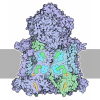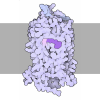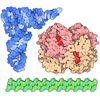+ Open data
Open data
- Basic information
Basic information
| Entry | Database: PDB / ID: 7sfk | ||||||
|---|---|---|---|---|---|---|---|
| Title | ChRmine in MSP1E3D1 lipid nanodisc | ||||||
 Components Components | ChRmine | ||||||
 Keywords Keywords | MEMBRANE PROTEIN / Channelrhodopsin / ion channel | ||||||
| Function / homology | 1,2-dioleoyl-sn-glycero-3-phosphoethanolamine / RETINAL Function and homology information Function and homology information | ||||||
| Biological species |  Rhodomonas lens (eukaryote) Rhodomonas lens (eukaryote) | ||||||
| Method | ELECTRON MICROSCOPY / single particle reconstruction / cryo EM / Resolution: 2.74 Å | ||||||
 Authors Authors | Tucker, K. / Brohawn, S. | ||||||
| Funding support |  United States, 1items United States, 1items
| ||||||
 Citation Citation |  Journal: Nat Commun / Year: 2022 Journal: Nat Commun / Year: 2022Title: Cryo-EM structures of the channelrhodopsin ChRmine in lipid nanodiscs. Authors: Kyle Tucker / Savitha Sridharan / Hillel Adesnik / Stephen G Brohawn /  Abstract: Microbial channelrhodopsins are light-gated ion channels widely used for optogenetic manipulation of neuronal activity. ChRmine is a bacteriorhodopsin-like cation channelrhodopsin (BCCR) more closely ...Microbial channelrhodopsins are light-gated ion channels widely used for optogenetic manipulation of neuronal activity. ChRmine is a bacteriorhodopsin-like cation channelrhodopsin (BCCR) more closely related to ion pump rhodopsins than other channelrhodopsins. ChRmine displays unique properties favorable for optogenetics including high light sensitivity, a broad, red-shifted activation spectrum, cation selectivity, and large photocurrents, while its slow closing kinetics impedes some applications. The structural basis for ChRmine function, or that of any other BCCR, is unknown. Here, we present cryo-EM structures of ChRmine in lipid nanodiscs in apo (opsin) and retinal-bound (rhodopsin) forms. The structures reveal an unprecedented trimeric architecture with a lipid filled central pore. Large electronegative cavities on either side of the membrane facilitate high conductance and selectivity for cations over protons. The retinal binding pocket structure suggests channel properties could be tuned with mutations and we identify ChRmine variants with ten-fold decreased and two-fold increased closing rates. A T119A mutant shows favorable properties relative to wild-type and previously reported ChRmine variants for optogenetics. These results provide insight into structural features that generate an ultra-potent microbial opsin and provide a platform for rational engineering of channelrhodopsins with improved properties that could expand the scale, depth, and precision of optogenetic experiments. | ||||||
| History |
|
- Structure visualization
Structure visualization
| Movie |
 Movie viewer Movie viewer |
|---|---|
| Structure viewer | Molecule:  Molmil Molmil Jmol/JSmol Jmol/JSmol |
- Downloads & links
Downloads & links
- Download
Download
| PDBx/mmCIF format |  7sfk.cif.gz 7sfk.cif.gz | 174.4 KB | Display |  PDBx/mmCIF format PDBx/mmCIF format |
|---|---|---|---|---|
| PDB format |  pdb7sfk.ent.gz pdb7sfk.ent.gz | 136.2 KB | Display |  PDB format PDB format |
| PDBx/mmJSON format |  7sfk.json.gz 7sfk.json.gz | Tree view |  PDBx/mmJSON format PDBx/mmJSON format | |
| Others |  Other downloads Other downloads |
-Validation report
| Arichive directory |  https://data.pdbj.org/pub/pdb/validation_reports/sf/7sfk https://data.pdbj.org/pub/pdb/validation_reports/sf/7sfk ftp://data.pdbj.org/pub/pdb/validation_reports/sf/7sfk ftp://data.pdbj.org/pub/pdb/validation_reports/sf/7sfk | HTTPS FTP |
|---|
-Related structure data
| Related structure data |  25091MC  7sfjC  7shsC M: map data used to model this data C: citing same article ( |
|---|---|
| Similar structure data |
- Links
Links
- Assembly
Assembly
| Deposited unit | 
| ||||||||||||||||||||||||||||||||||||||||||||||||||||||||||||||||||||||||||||||||||||||||||||||||||||||||||||||||||
|---|---|---|---|---|---|---|---|---|---|---|---|---|---|---|---|---|---|---|---|---|---|---|---|---|---|---|---|---|---|---|---|---|---|---|---|---|---|---|---|---|---|---|---|---|---|---|---|---|---|---|---|---|---|---|---|---|---|---|---|---|---|---|---|---|---|---|---|---|---|---|---|---|---|---|---|---|---|---|---|---|---|---|---|---|---|---|---|---|---|---|---|---|---|---|---|---|---|---|---|---|---|---|---|---|---|---|---|---|---|---|---|---|---|---|---|
| 1 |
| ||||||||||||||||||||||||||||||||||||||||||||||||||||||||||||||||||||||||||||||||||||||||||||||||||||||||||||||||||
| Noncrystallographic symmetry (NCS) | NCS domain:
NCS domain segments:
|
 Movie
Movie Controller
Controller



 UCSF Chimera
UCSF Chimera


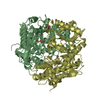
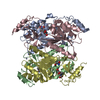


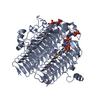
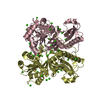
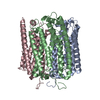
 PDBj
PDBj
